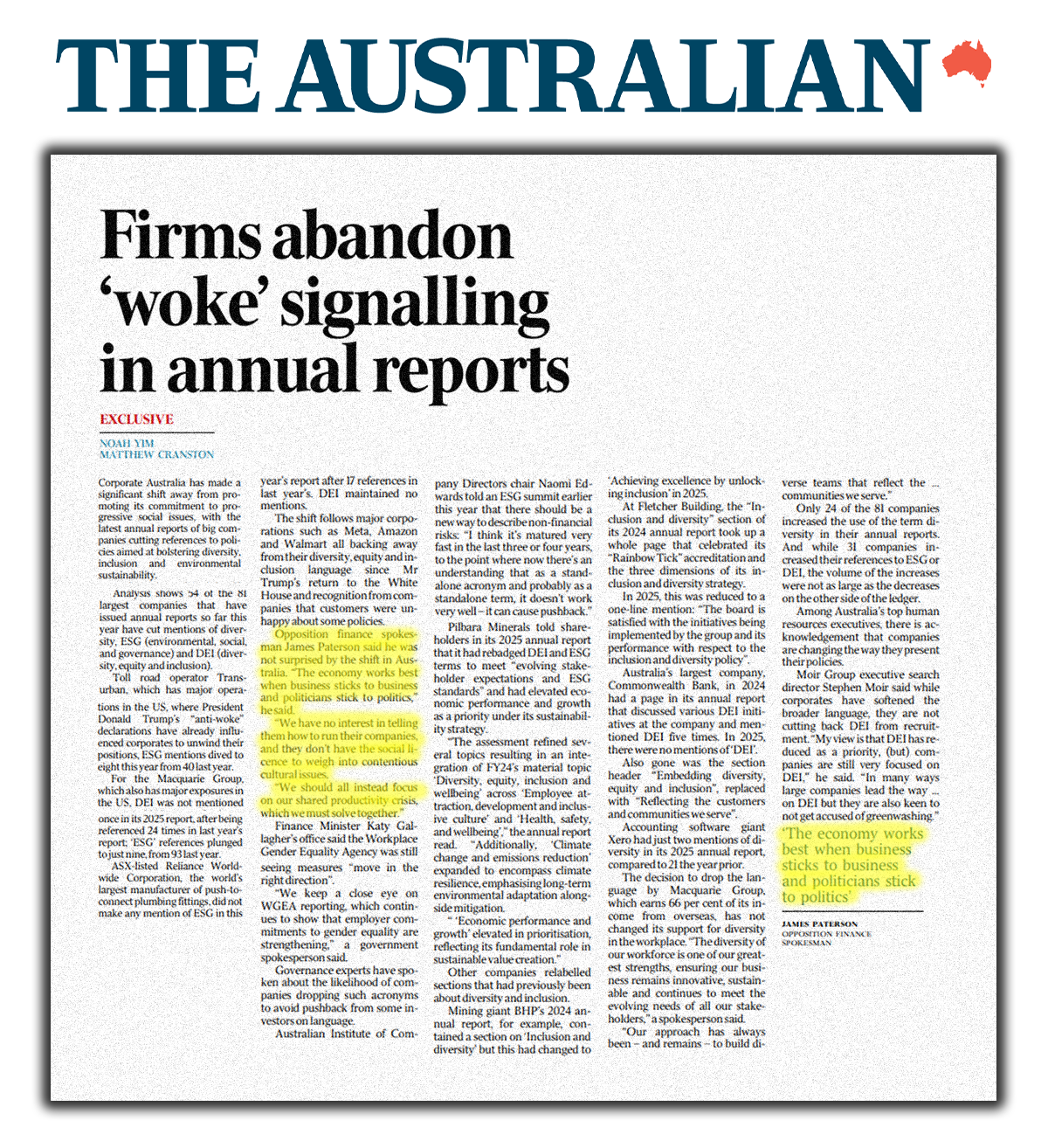Media
|
News
September 8, 2025

Firms abandon 'woke' signalling in annual reports Corporate Australia has made a significant shift away from promoting its commitment to progressive social issues, with the latest annual reports of big companies cutting references to policies aimed at bolstering diversity, inclusion and environmental sustainability.
Analysis shows 54 of the 81 largest companies that have issued annual reports so far this year have cut mentions of diversity, ESG (environmental, social, and governance) and DEI (diversity, equity and inclusion).
Toll road operator Transurban, which has major operations in the US, where President Donald Trump's "anti-woke" declarations have already influenced corporates to unwind their positions, ESG mentions dived to eight this year from 40 last year.
For the Macquarie Group, which also has major exposures in the US, DEI was not mentioned once in its 2025 report, after being referenced 24 times in last year's report; 'ESG' references plunged to just nine, from 93 last year.
ASX-listed Reliance Worldwide Corporation, the world's largest manufacturer of push-toconnect plumbing fittings, did not make any mention of ESG in this year's report after 17 references in last year's. DEI maintained no mentions.
The shift follows major corporations such as Meta, Amazon and Walmart all backing away from their diversity, equity and inclusion language since Mr Trump's return to the White House and recognition from companies that customers were unhappy about some policies.
Opposition finance spokesman James Paterson said he was not surprised by the shift in Australia. "The economy works best when business sticks to business and politicians stick to politics," he said.
"We have no interest in telling them how to run their companies, and they don't have the social licence to weigh into contentious cultural issues.
"We should all instead focus on our shared productivity crisis, which we must solve together."
Finance Minister Katy Gallagher's office said the Workplace Gender Equality Agency was still seeing measures "move in the right direction".
"We keep a close eye on WGEA reporting, which continues to show that employer commitments to gender equality are strengthening," a government spokesperson said.
Governance experts have spoken about the likelihood of companies dropping such acronyms to avoid pushback from some investors on language.
Australian Institute of Company Directors chair Naomi Edwards told an ESG summit earlier this year that there should be a new way to describe non-financial risks: "I think it's matured very fast in the last three or four years, to the point where now there's an understanding that as a standalone acronym and probably as a standalone term, it doesn't work very well it can cause pushback."
Pilbara Minerals told shareholders in its 2025 annual report that it had rebadged DEI and ESG terms to meet "evolving stakeholder expectations and ESG standards" and had elevated economic performance and growth as a priority under its sustainability strategy.
"The assessment refined several topics resulting in an integration of FY24's material topic 'Diversity, equity, inclusion and wellbeing' across 'Employee attraction, development and inclusive culture' and 'Health, safety, and wellbeing'," the annual report read. "Additionally, 'Climate change and emissions reduction' expanded to encompass climate resilience, emphasising long-term environmental adaptation alongside mitigation.
" 'Economic performance and growth' elevated in prioritisation, reflecting its fundamental role in sustainable value creation."
Other companies relabelled sections that had previously been about diversity and inclusion.
Mining giant BHP's 2024 annual report, for example, contained a section on 'Inclusion and diversity' but this had changed to 'Achieving excellence by unlocking inclusion' in 2025.
At Fletcher Building, the "Inclusion and diversity" section of its 2024 annual report took up a whole page that celebrated its "Rainbow Tick" accreditation and the three dimensions of its inclusion and diversity strategy.
In 2025, this was reduced to a one-line mention: "The board is satisfied with the initiatives being implemented by the group and its performance with respect to the inclusion and diversity policy".
Australia's largest company, Commonwealth Bank, in 2024 had a page in its annual report that discussed various DEI initiatives at the company and mentioned DEI five times. In 2025, there were no mentions of 'DEI'.
Also gone was the section header "Embedding diversity, equity and inclusion", replaced with "Reflecting the customers and communities we serve".
Accounting software giant Xero had just two mentions of diversity in its 2025 annual report, compared to 21 the year prior.
The decision to drop the language by Macquarie Group, which earns 66 per cent of its income from overseas, has not changed its support for diversity in the workplace. "The diversity of our workforce is one of our greatest strengths, ensuring our business remains innovative, sustainable and continues to meet the evolving needs of all our stakeholders," a spokesperson said.
"Our approach has always been and remains to build diverse teams that reflect the ... communities we serve."
Only 24 of the 81 companies increased the use of the term diversity in their annual reports. And while 31 companies increased their references to ESG or DEI, the volume of the increases were not as large as the decreases on the other side of the ledger.
Among Australia's top human resources executives, there is acknowledgement that companies are changing the way they present their policies.
Moir Group executive search director Stephen Moir said while corporates have softened the broader language, they are not cutting back DEI from recruitment. "My view is that DEI has reduced as a priority, (but) companies are still very focused on DEI," he said. "In many ways large companies lead the way ... on DEI but they are also keen to not get accused of greenwashing."